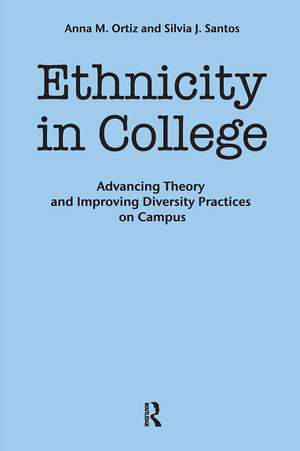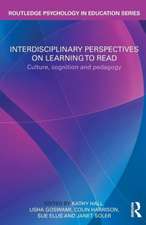Ethnicity in College: Advancing Theory and Improving Diversity Practices on Campus
Autor Anna M. Ortiz, Silvia J. Santosen Limba Engleză Paperback – 20 iul 2009
| Toate formatele și edițiile | Preț | Express |
|---|---|---|
| Paperback (1) | 312.41 lei 6-8 săpt. | |
| Taylor & Francis – 20 iul 2009 | 312.41 lei 6-8 săpt. | |
| Hardback (1) | 1000.88 lei 6-8 săpt. | |
| Taylor & Francis – 23 iul 2009 | 1000.88 lei 6-8 săpt. |
Preț: 312.41 lei
Nou
Puncte Express: 469
Preț estimativ în valută:
59.83€ • 61.64$ • 50.12£
59.83€ • 61.64$ • 50.12£
Carte tipărită la comandă
Livrare economică 25 februarie-11 martie
Preluare comenzi: 021 569.72.76
Specificații
ISBN-13: 9781579223328
ISBN-10: 157922332X
Pagini: 416
Dimensiuni: 152 x 229 x 28 mm
Greutate: 0.57 kg
Ediția:New.
Editura: Taylor & Francis
Colecția Routledge
Locul publicării:Oxford, United Kingdom
ISBN-10: 157922332X
Pagini: 416
Dimensiuni: 152 x 229 x 28 mm
Greutate: 0.57 kg
Ediția:New.
Editura: Taylor & Francis
Colecția Routledge
Locul publicării:Oxford, United Kingdom
Public țintă
PostgraduateCuprins
Preface 1. Introduction to the Study 2. Ethnic Identity’s Theoretical and Research Traditions 3. Asian Americans. Feet in Two Worlds, Making a Third 4. African Americans. Pride through Legacy and Action 5. Latino/a Americans. Bringing the Family Along 6. White Americans. Trying to Make Sense of it All 7. Influences of Diverse University Contexts on Student Ethnic Identity and College Adjustment 8. The Ethnic Experiences of College Appendix. Overview of Study Design and Methodology References Index
Notă biografică
Anna M. Ortiz is department chair and professor of Educational Leadership at California State University, Long Beach. She has 27 years of experience in academic and student affairs. She has served as the new faculty mentorship coordinator for 7 years in the College of Education at CSULB and has coordinated and/or presented at several AERA Division J new faculty institutes and NASPA doctoral seminars, and is the inaugural Director of the NASPA Faculty Division. She has published extensively on the experiences of diverse students in higher education and on career issues for both student affairs administrators and faculty.
Silvia J. Santos is Professor of Psychology at California State University, Dominguez Hills.
Silvia J. Santos is Professor of Psychology at California State University, Dominguez Hills.
Recenzii
"Reading Ethnicity in College is like taking a course in ethnicity and its effects on college students....It is useful for not just learning about specific groups but also helpful for gaining perspective into student experiences as garnered from their own words."
NACADA Journal (National Academic Advising Association)
"Ortiz and Santos accomplish their goal of discovering how college students make meaning of their ethnicity in a multicultural world... The work's key strenghts include a comprehensive literature review and multi-method research design. The qualitative data adds exponentially to the findings and conclusions... All involved in higher education need to be aware of students' need to develop and express their ethnic identities. This invaluable resource is a must read. Summing Up: Essential."
Choice
"By studying the experiences of 120 Southern California college students, researchers Ortiz and Santos take an in-depth look at the role college plays in ethnic identity development. Their book provides a close look at the divergent developmental paths traversed by students of different ethnicities, and the effect college has on students' understanding of their ethnicity. With smart analysis and helpful suggestions for maximizing the positive effects of campus diversity, the volume is a significant contribution to the literature on identity, diversity, and education."
Diversity & Democracy (AAC&U)
“In this book, we come to understand how race, ethnicity, and culture are foundational for higher education into the twenty-first century. What is particularly compelling about Ortiz and Santos’ exploration of ethnic identity development is the persuasive linkage they make to the literature on the educational effects of diversity in college. The quantitatively-dominated literature in that field has clearly established relationships between cross-cultural interaction and many democratic, educational, and developmental outcomes. And while racial differences are found, we are largely unable to fully account for them. Ortiz and Santos provide a tremendously important yet missing piece to this literature.
Practitioners will come to find this book as a valuable resource for understanding how ethnic identity development is intertwined in all aspects of student life, both inside and outside the classroom. Researchers as well as practitioners will appreciate the deep insight this study provides to our understanding of ethnic relations and the relationship between diversity and development on campus.”
With its comparative, multi-ethnic design and its contributions to theory, knowledge, and practice, this book stands out in the higher education literature.”
Anthony Lising Antonio, Associate Director, Stanford Institute for Higher Education Research, and Associate Professor, School of Education
Stanford University
“This book provides a thorough description of ethnic identity theories and previous research on the identity processes of White, African American, Latino and Asian American individuals. The authors’ careful multi-method study of student development across these racial and ethnic groups provides unique opportunities to link institutional policies and practices to encouraging student growth and change. Educators and scholars alike will find helpful information and analyses.”
Deborah Faye Carter, co-author of Bridging Key Research Dilemmas and Associate Professor, Director of the Center for the Study of Higher and Postsecondary Education
University of Michigan
NACADA Journal (National Academic Advising Association)
"Ortiz and Santos accomplish their goal of discovering how college students make meaning of their ethnicity in a multicultural world... The work's key strenghts include a comprehensive literature review and multi-method research design. The qualitative data adds exponentially to the findings and conclusions... All involved in higher education need to be aware of students' need to develop and express their ethnic identities. This invaluable resource is a must read. Summing Up: Essential."
Choice
"By studying the experiences of 120 Southern California college students, researchers Ortiz and Santos take an in-depth look at the role college plays in ethnic identity development. Their book provides a close look at the divergent developmental paths traversed by students of different ethnicities, and the effect college has on students' understanding of their ethnicity. With smart analysis and helpful suggestions for maximizing the positive effects of campus diversity, the volume is a significant contribution to the literature on identity, diversity, and education."
Diversity & Democracy (AAC&U)
“In this book, we come to understand how race, ethnicity, and culture are foundational for higher education into the twenty-first century. What is particularly compelling about Ortiz and Santos’ exploration of ethnic identity development is the persuasive linkage they make to the literature on the educational effects of diversity in college. The quantitatively-dominated literature in that field has clearly established relationships between cross-cultural interaction and many democratic, educational, and developmental outcomes. And while racial differences are found, we are largely unable to fully account for them. Ortiz and Santos provide a tremendously important yet missing piece to this literature.
Practitioners will come to find this book as a valuable resource for understanding how ethnic identity development is intertwined in all aspects of student life, both inside and outside the classroom. Researchers as well as practitioners will appreciate the deep insight this study provides to our understanding of ethnic relations and the relationship between diversity and development on campus.”
With its comparative, multi-ethnic design and its contributions to theory, knowledge, and practice, this book stands out in the higher education literature.”
Anthony Lising Antonio, Associate Director, Stanford Institute for Higher Education Research, and Associate Professor, School of Education
Stanford University
“This book provides a thorough description of ethnic identity theories and previous research on the identity processes of White, African American, Latino and Asian American individuals. The authors’ careful multi-method study of student development across these racial and ethnic groups provides unique opportunities to link institutional policies and practices to encouraging student growth and change. Educators and scholars alike will find helpful information and analyses.”
Deborah Faye Carter, co-author of Bridging Key Research Dilemmas and Associate Professor, Director of the Center for the Study of Higher and Postsecondary Education
University of Michigan
Descriere
This book explores the importance, and construction, of ethnic identity among college students, and how ethnicity interfaces with students’ interactions on campus, and the communities in which they live. This book is intended as a resource for researchers and practitioners in psychology and higher education.










